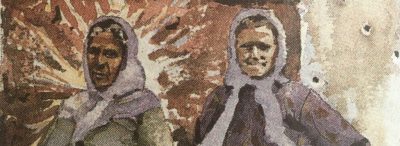Palestinian Prisoners – An Ongoing Struggle for Justice

All Global Research articles can be read in 51 languages by activating the “Translate Website” drop down menu on the top banner of our home page (Desktop version).
***
Today 04.27.2021, Human Rights Watch published a report on the crimes of apartheid committed against Palestinians.
Probably no area of the world has changed as much as Arab lands of the Levant—Lebanon, Syria, Palestine, Iraq, and Jordan. From the late 80s through the 90s, I was a correspondent there, documenting the tumultuous, insecure lives of their citizens.
Given the transformations since– the lost struggles, and the ongoing pursuit of justice–I am reprinting some of my articles for you. The first is my 1994 report on Palestinian prisoners; it reminds us of the vicissitudes of an ongoing struggle with thousands languishing in jail, lost land and homes, daily indignities. (The above image, by CSM artist, accompanied my article.)
*
Keeping Palestinian Prisoners in View. Originally published Feb 2, 1994 in The Christian Science Monitor.
By Barbara Nimri Aziz
Palestinians in the Occupied Territories have yet to hear the news that most concerns them: the release of all their sons and brothers from Israeli prisons. When the Palestine Liberation Organization signed the accord with Israeli in September, virtually every Palestinian family expected that freeing political prisoners would be among the first steps Israel would take to show its goodwill. It would be easy to implement and an important symbolic move, they thought.
“The release of prisoners should have been a precondition to the signing,” says a West Bank man, a prisoner himself for five years. “After all,” notes another ex-prisoner, “most of us were arrested because we were suspected members of a PLO party; now Israel’s recognition of the PLO makes our detention invalid.”
This feeling runs deep. Arrests are so widespread under Israeli occupation that prison experience links the entire Palestinian population with a sense of common suffering and sacrifice. Almost every man over the age of 17 has been arrested and detained; hardly a household lacks an ex-prisoner in it. Many families have several members with prison experience. Thousands have been imprisoned more than once; and almost all detainees experience torture.
Thus, the current demand for amnesty is not simply about the 11,500 men and women still held. Palestinians say an amnesty would vindicate those hundreds of thousands arrested, interrogated, and tortured since 1967 and before that as well. One PLO source estimates that 200,000 Palestinians have direct prison experience. By the Israeli police’s own accounting, as of last October a total of 105,725 have been held since the intifada began in 1987.
In October 1993, after PLO Chairman Yasser Arafat and Israeli Prime Minister Yitzhak Rabin signed the accord, a mere 560 out of 13,000 political prisoners were released. The accord received international press attention but did not satisfy the Palestinian population which knew that most of those freed were within weeks of a scheduled release anyway; moreover the 560 (not 640 as announced by Israel) did not include special cases of old, sick and female prisoners. Palestinians felt further insulted when they saw PLO had merely negotiated release of member of Fatah, the PLO party that Mr. Arafat heads.
Arafat’s apparent inability to overcome personal and party biases and the PLO’s weak negotiating power confronts Palestinians with unhappy realities as the Declaration for Principles is put to the test of implementation.
The issue of political prisoners has long been a major concern to Palestinians because those arrested represent their relentless struggle for statehood. Prisoners are heroes to their families; and prison experience is central to the resistance movement. Many who felt they were unjustly held pr who suffered extreme hardship in prison became more committed to political resistance; some joined radical Islamic parties.
The heroism of the prisoners among Palestinians us heightened by the inhumane conditions in which the prisoners are held captive and the perceived false justice under which they are tried. Stories of detainees’ endurance circulate through the population. Families of members of Hamas and other parties who might have thrown their weight behind the PLO leadership are increasingly disinclined to support it. One funds that hose young rebels taking up arms against both Israel and their Palestinian partners are the brothers, sons and close friends of the unjustly imprisoned.
Prisoners’ rights groups inside Israel and among Palestinians are working tirelessly, although with little success, for the release of those unjustly arrested and for improved prison conditions. Reports by international human rights organizations repeatedly criticize the Israeli military for excessive use of force in interrogation and for subhuman conditions in the 21 prisons and detention centers where Palestinians are held. Israel has consistently flouted this censure and defied international conventions regarding prisoners’ rights.
The ineffectiveness of outside pressure groups led to a prison-wide hunger strike in 1992 by more than 14,000 Palestinians then held in Israeli jails and camps. Under immense pressure, Israeli authorities agreed to some of the demands and international attention waned.
But today, 17 months later, almost none of the terms agreed to have been met; moreover, rights activists report, conditions of Palestinian prisoners are worse than ever.
Ahmad Sayyad, director of the political prisoner’s rights group Mandela Institute, based in the West Bank town of Ramallah, notes the lack of progress with dismay. Especially troubling are health conditions of prisoners. He reports that several deaths in detention occurred in recent months; and men who received bullet wounds and injuries before arrest are regularly held without medical attention.
Mr. Sayyed worried that with international attention now focused on political talks, prisoners have less protection than before. “Outside concern for prisoners has fallen off since the accord; so have funds supporting human rights work inside the territories,” he says.
This situation has deeper political repercussions, fueling disillusionment about the peace process.
Palestinians note that members of the United States Congress speak out on behalf of missing Israeli soldiers in Lebanon and of Israel’s call for amnesty for 300 of their collaborators, while they see more delays regarding the Palestinian prisoners who, they charge, are now being held as political hostages.
If those political prisoners’ rights cannot be won in the early stages, what, Palestinians ask, are our chances for autonomy and democracy as the negotiations proceed?
*
Note to readers: please click the share buttons above or below. Forward this article to your email lists. Crosspost on your blog site, internet forums. etc.
This article was originally published on the author’s blog site, Barbara Nimri Aziz.
BN Aziz whose anthropological research has focused on the peoples of the Himalayas is the author of the newly published “Yogmaya and Durga Devi: Rebel Women of Nepal”, available on Amazon.


